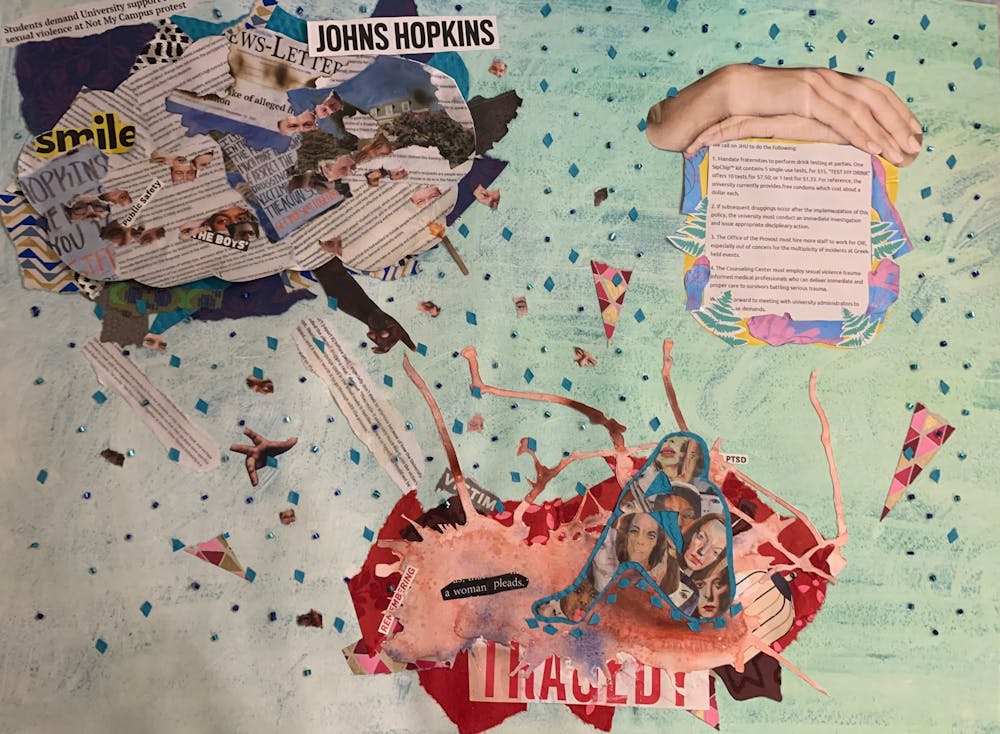In the wake of the announcement of an alleged drugging at Sigma Phi Epsilon and subsequent Not My Campus protest last semester, students are engaged in a dialogue with members of the administration to discuss potential reforms to support survivors and mitigate sexual misconduct on campus.
Survey
Junior Robab Vaziri created the Office of Institutional Equity (OIE) Satisfaction Survey to analyze the experiences of survivors of sexual violence on campus and on the investigation process. Members of the OIE worked with Vaziri to create the survey questions, but does not monitor the results of the survey. The survey also gathers survivors’ input on the reforms they would like to see at the University.
In an interview with The News-Letter, Vaziri explained that she created the survey as a research project after going through an OIE investigation her freshman year and being interested in disciplinary process on different college campuses.
“I was reading papers in law journals... There were a lot of concerns over the fact that these university disciplinary procedures regarding sexual violence are shrouded in secrecy. There's no public information about how they're conducted,” she said.
20 people have filled out the survey so far, including undergraduate students, graduate students and staff members. According to the complainants who filled out the survey, the respondents in their investigations included undergraduate students, graduate students and faculty members.
Vaziri elaborated on her goals for the survey. She hopes the results can be shared to draw attention to the lack of public dissemination of information surrounding specific OIE investigations, emphasizing that all publicized data should be non-identifying.
“This is a systemic problem. All campuses across the country do this. They don't share information about their investigation,” she said. “I hope that we can consider in the future whether OIE releasing anonymized public data is something that we want to endorse as a university.”
Vice President for Communications Andrew Green wrote in an email to The News-Letter that OIE releases annual reports with statistics on investigations. The 2020 report is available online; according to Green, the 2021 report will be published this semester. Additionally, Green noted that the University also releases reports on its campus climate surveys on sexual misconduct.

COURTESY OF ROBAB VARIZI.
This word map represents when survey respondents experienced sexual violence.
The incidents reported in Vaziri’s survey occurred from between 2015 to 2020. They occurred in classrooms, in residence halls, in other University buildings, in off-campus housing, over social media and email and in fraternity houses.
When asked if disciplinary actions should be taken against Greek-life organizations, 10 of the survey respondents said that only Greek organizations found responsible for misconduct should be disciplined, while one respondent believes all fraternities at the University should be abolished and three of the respondents said all Greek organizations at the University should be abolished. Five of the respondents chose not to respond to this question, and one indicated “other.”

COURTESY OF ROBAB VARIZI.
Vaziri created this word map to display locations of incidents as reported by survey respondents.
Vaziri reflected on these results, pointing out that survivors of sexual violence at Greek events who filled out the survey also discussed the role of alcohol at these events.
“Respondents who were survivors of sexual violence at Greek-held events... wanted to hold individual organizations responsible. That's particularly relevant if we are interested in what survivors of these Greek-life events actually want,” she said. “It seems like a significant number of these events involve the use of alcohol, so that points to potential problems with drinking culture... We might need to reassess the efficacy of our sober monitors.”
Potential Changes
Junior Eleanor Franklin, codirector of Sexual Assualt Resource Unit (SARU), discussed SARU’s approaches and how the lack of institutional control presents difficulties to making policy changes in an interview with The News-Letter.
“[At] SARU... our focus is pretty broad because we're the only organization at the University that does any sort of sexual assault advocacy work,” they said. “A lot of our mitigation efforts tend to focus on promoting consent culture on campus among the student body. Something that's definitely frustrating is that we don't have a lot of actual institutional control to make changes happen. A lot of what we can do is more about shifting attitudes [and] shifting culture.”
Franklin has attended several meetings with members of the administration along with leaders of last semester’s Not My Campus protest and has discussed streamlining the response process surrounding sexual misconduct cases. Currently, cases have to pass through several departments.
Vaziri pointed out some issues this poses, including survivors having to recount their stories multiple times and investigator burnout.
“My investigation lasted like 190 or 200 days. That's a really long time. It seemed to me my investigator was kind of burned out. They should not have to deal with a lot of really traumatizing cases without having breaks,” she said. “Overworked investigators can come off as more insensitive and we don't want that when they're dealing with really delicate cases.”
According to many of the people who filled out Vaiziri’s survey and students interviewed by The News-Letter, delays occured because departments such as the OIE are underfunded and understaffed.
Green emphasized the University’s commitment to increasing staffing and funding for OIE.
“In recent years, the University made a significant commitment to increasing the staffing in OIE. We are currently fully staffed and have had no interruptions in our investigator staffing for over a year,” he wrote. “In the event that our workflow exceeds our internal capacity, OIE is able to quickly partner with experienced external lawyers who serve as OIE investigators and apply OIE’s policies and procedures. We also routinely check in with our team to address any signs of ‘burnout’ among our investigators.”
He also discussed why cases often have long durations.
“In part due to increased staffing, our case resolution times have continually decreased in recent years, though sexual misconduct matters can take longer to complete than other investigations for a host of reasons,” he wrote. ”Some delays (such as certain due process timelines established by Title IX) are wholly outside of our control, no matter how many investigators we have. Other delays are related to unavailability of the complainant, the respondent or witnesses. And still other delays can be attributed to the complexity of matters that are reported to our office.”
According to Green, several measures have been implemented to address sexual misconduct on campus: The Office of Fraternity and Sorority Life includes information on sexual misconduct during orientations, Harm Reduction Week is held during the spring semester, OIE meets with chapter leaders to discuss the Title IX process and Pillars, a continuing education program, includes content on sexual misconduct and resources.
Franklin highlighted that distributing drink-test kits has been suggested to allow students to self-test their drinks at parties but emphasized that this is not the only action the University should take.
“Any structured supply of drink tests to students is essentially putting the burden on students to protect themselves from being drugged. It will look really bad if that's the University's initial response... There have been repeated attempts by survivors to have the University take action against the organizations they were drugged by,” they said. “The University has continually ignored those people... [If] the first thing that [administrators] do when they finally take action is to give people drink tests basically to protect yourself... That's obviously not acceptable.”
Franklin presented the idea of having a drink-testing monitor at parties as a more productive reform. They believe this would be effective because it would also result in records of test results and drug use at Greek events.
“Something we could envision being productive would be to have a designated drink-testing monitor at Greek events the same way that all Greek events are required to have sober party monitors,” they said. “It would be somebody from the organization who would be designated to test drinks before they're handed out to people... There should be records kept of how many drinks are being served [and if all] of them are being tested.”
Robab Vaziri is a contributing writer for The News-Letter. She was not involved in the reporting, writing or editing of this article.





